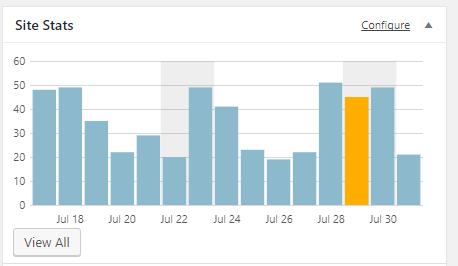It’s the end of the month, a time when I tally my online earnings and figure out how much I made.
Traditionally, July sucks for sales (at least in my opinion), but this year turned out different. The last 30 days have actually been my most profitable of all time.
Because of this, I thought I’d write-up a short post on 5 rules for building a web business.
Here’s my advice.
1. Sell To The Broadest Audience Possible
In the age of memes, Internet communities, and niche interests, it’s easy to over-inflate the scope of some tiny, obscure movement.
Hang out on a conspiracy forum all day, and you’ll start to think that every American knows about flat Earth theory or reptilians. The echo-chamber of Internet culture makes it easy to distort how important a topic really is.
As such, you see a lot of people who get into a small Internet community and then try building their business around it.
The results are rarely successful.
Avoid this issue, by simply creating a venture that appeals to the widest audience possible.
One of the first websites I ever made completely violated this law. I built a site aimed at people who enjoyed Spry chewing gum, but didn’t live near a store that sold it.
I was 19 at the time, and apparently dumb enough to think that was an untapped market.
As you can guess, that site got tens of pageviews over the course of its lifetime.
When you’re just starting out, it’s better to focus on a mass market field with “built-in buyers.”
These are subjects the general public is already interested in. Things like weight loss, fitness, dating, how to make money, home appliances, technological gadgets, and so on.
It’s easier to profit off an already successful niche than it is to cater to some small minority of obscure prospects.
2. Learn Some Basic Math
All business runs on math.
If you want to be successful, you’d better learn some basic calculations.
At the very least, you should understand Expectation Value. This is something I learned about from the book Small Stakes Hold ’em, by Ed Miller.
Basically, this allows you to determine how much you win or lose (on average), by performing a certain action.
Here’s an example.
Suppose you earn $100 for every 1,000 pageviews your website gets.
This means that your Expectation Value (per pageview) is +$0.10.
If you want to make $1,000, you need 10,000 pageviews. It’s simple math, but most people never think like this. Instead, they flounder around, failing to recognize what actually impacts their earnings.
3. Read More
The great marketing agency Ogilvy & Mather won’t take on a project for less than $50,000. If you want their help with your ad campaign, you’d better have lots of cash.
Of course, you can also get all the information you need to write your own ads (from Ogilvy & Mather’s founder), in paperback for $15.95.
Books are a wonderful thing.

Every business idea I’ve ever had came from reading about something and then implementing what I learned.
Back in the spring, I picked up a book called The Millionaire Real Estate Agent. In the first hundred pages, the author talks about finding your “why” or figuring out the subconscious reason you desire more money.
Sounds hokey, but I did the books little exercise, figured out how much extra I wanted to earn (plus the “why” behind this), and had that money within the next 45 days.
The right books open up new doors to places you never thought possible.
4. Think For Yourself
To quote a character from Starship Troopers, “Figuring things out for yourself is the only real freedom anyone really has. Use that freedom.”
Sadly, most people subscribe to the “communal brain” model of thinking. They want someone else to plan everything for them and provide them an exact blueprint for success. Unless they’re given step-by-step instructions on everything, these folks will never take action.
This is pretty dumb in most situations, but it’s especially stupid if you’re interested in building your own business or achieving any sort of self-determination.
Most public advice is made to sound feel-good and reassuring.
Likewise, many big earners (especially in non-tangible fields like finance or Internet stuff), make their money through questionable gray-area practices.
If you’ve read the book Efficiency (it’s really good, I highly recommend it), you’ll know that most of the huge affiliate marketers use unethical – and sometimes illegal – sales tactics. This is stuff like making impossible claims, re-billing customers without their knowledge, or manipulating technical glitches for massive profit.
Trying to compare your success to a guy with hundreds of thousands of dollars in paid traffic, massive botnets, and dozens of employees is like buying a few stocks and then wondering why you aren’t getting Bernie Madoff style returns.
Reading and studying others is important. But, if that’s all you do, you’re getting left in the dark.
Go test things for yourself, and see what happens.
10 hours of action teaches you infinity more than any amount of books, YouTube videos, or blog posts ever could.
5. Put Things Into Perspective
In the summer of 2016, I decided to build as many niche sites as possible.
I’d just gotten the hang of creating good SEO content, and I wanted to hone my skills while earning some extra money on the side.
I think I made about 10 sites in total, seven of which were profitable.
However, none of them were ever big earners. All were hastily made, had bare-bones content, and were plagued by rookie mistakes in terms of finding products to sell and picking successful affiliate offers.
Pro-tip: Never sell “premium” website subscriptions when a standard membership comes fully functional and without any handicapped features. (Think Plenty Of Fish vs. Plenty Of Fish Upgraded).
Anyway, by most metrics, these sites were kind of disappointing. Each one generates less than $200 a month. And, in terms of traffic, they all average around 1,200 – 3,000 pageviews per 30 days. Nothing to write home about.

(Cue The Price is Right losing horn)
Paltry traffic aside, each site brings in roughly $100 a month (July’s lowest earner was $90, while the highest earner brought in $151.97).
That’s $1,200 a year.
Each site’s total upkeep is an annual $25 domain renewal, and maintenance takes 10 minutes a month.
In terms of passive income, every one of those hastily made sites is the same as having a $25,000 mutual fund with 4.5% returns.
Not too bad when you put things in perspective.
Always look at how much time and effort you’re pouring into a project versus how much it’s paying you.
In most cases, you’ll be pleasantly surprised.